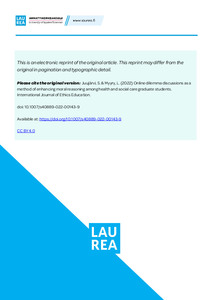Online dilemma discussions as a method of enhancing moral reasoning among health and social care graduate students
Juujärvi, Soile; Myyry, Liisa (2022)
Juujärvi, Soile
Myyry, Liisa
Springer Science and Business Media LLC
2022
Julkaisun pysyvä osoite on
https://urn.fi/URN:NBN:fi-fe2022060343321
https://urn.fi/URN:NBN:fi-fe2022060343321
Tiivistelmä
Dilemma discussions have been proven to be one of the most effective methods to enhance students’ moral reasoning in ethics education. Dilemma discussions are increasingly arranged online, but research on the topic has remained sparse, especially in the context of continuing professional education. The aim of the present paper was to develop a method of dilemma discussions for professional ethics. The method was based on asynchronous discussions in small groups. Health and social care students raised work-related dilemmas from their experiences and discussed them in terms of professional values, ethical guidelines and theories. Participants in this quasi-experimental study were 87 first term graduate students at a Finnish university of applied sciences. Health and social care students in two consecutive ethics courses constituted two experiment groups, whereas
health and social care students and business students in other programmes served as control groups. Students filled in a Defining Issues Test (DIT2) at the beginning of their studies and three months apart. Statically significant increase in moral reasoning was evidenced for experiment group 2, when discussion groups were purportedly composed to maximise differences in initial levels of moral reasoning. Findings suggest that online dilemma discussions can advance students’ moral reasoning development, especially when students’ exposure to higher-level arguments is ensured through complementary means, such as instructions, examples and plenary discussions. Online real-life dilemma discussions may also serve other important goals of ethics education, especially acquiring
ethical concepts, and they can promote other components of ethical decision making: ethical sensitivity and motivation, and acquisition of implementation skills.
health and social care students and business students in other programmes served as control groups. Students filled in a Defining Issues Test (DIT2) at the beginning of their studies and three months apart. Statically significant increase in moral reasoning was evidenced for experiment group 2, when discussion groups were purportedly composed to maximise differences in initial levels of moral reasoning. Findings suggest that online dilemma discussions can advance students’ moral reasoning development, especially when students’ exposure to higher-level arguments is ensured through complementary means, such as instructions, examples and plenary discussions. Online real-life dilemma discussions may also serve other important goals of ethics education, especially acquiring
ethical concepts, and they can promote other components of ethical decision making: ethical sensitivity and motivation, and acquisition of implementation skills.
